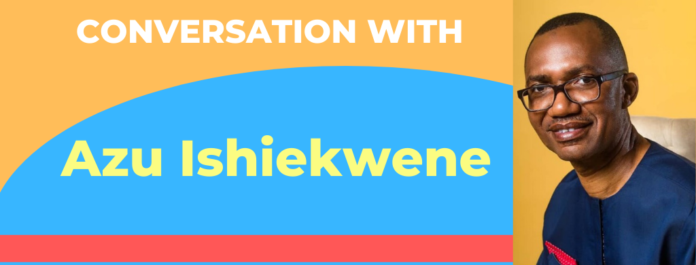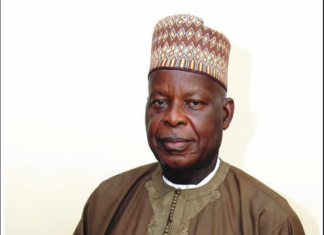It’s amazing how in eight years things have come full circle in Nigeria from Fe-Buhari to Le-Buhari (‘chase Buhari’ in Yoruba; and in Igbo, a mocking variant, ‘see Buhari’).
By Azu Ishiekwene
It’s hard to imagine that it’s nearly eight years since. This time in 2015, I was over the moon with the prospects of a general election that was certain to end the government of President Goodluck Jonathan, which had lost its way.
Folks were so excited at the prospects of change that in the South-West, a Yoruba version of “February” the month of the general election, was improvised: “Fe-Buhari”; meaning, “Love Buhari”, thus investing him with the aura of Cupid, the Greek god of erotic love. That’s how over the moon we were. Not without a reason.
Boko Haram’s violent extremism was at its worst. Life on the streets, schools, and home was insecure. Corruption was rife and audacious in Nigeria. Jonathan claimed he was doing his best, but wherever you went, it felt different.
His government had obviously been captured by forces beyond him. A sad fact that he publicly admitted more than once, but which did not acquit him. A president is elected to solve problems, not make excuses.
When the wind finally got out of his sails, Jonathan invoked the consolation of failing leaders: the benevolence of history. History, he said, would remember him kindly.
On the eve of another presidential election nearly eight years after those forlorn words, it does seem history may, after all, be kind to Jonathan the man famously called Nigeria’s most “incompetent and clueless” president. In a twist of fate, his successor, Muhammadu Buhari, thought to be the most capable to nail Jonathan’s political coffin, may well be the one who writes him into sainthood.
As Nigerians go to the ballot on Saturday, February 25 to elect a new president, not a few voters think that the worst mistake would be to let Buhari happen again.
READ ALSO: When polls are rigged before Election Day
Not that he is on the ballot. He has exhausted his eight-year constitutionally permitted tenure of two terms. But as his broken promises on security, poverty alleviation and corruption stalk voters to the 176,606 polling centres across the country, the last thing they want is to cast a vote that repeats the error of 2015.
Buhari solved a few old problems, of course. Boko Haram is in significant retreat. More supplies and equipment are reaching soldiers at the frontlines. Also, greater attempts have been made to provide infrastructure, stimulate agriculture and restructure the super-opaque oil and gas industry.
But new problems have replaced old ones. The most debilitating being the calamitous absence of Buhari. Never a man to interfere with his subordinates once he has appointed them, in his last days in office, things have gotten worse. He is present only in name, going from delegation of authority to spectatorship and from spectatorship to surrender. Abdication next? The cat is away and the mice party was never so boisterous.
If voters remember Jonathan as the president who always seemed too confused to get a grip on his government and too besieged to even recognise that he was in charge, they will remember Buhari as the president who loved his office so passionately, he forgot why he was voted in the first place.
In Buhari’s eight years in office, nothing summarises his unfortunate isolation and aloofness from the common misery like the current crisis over the redesign of three of the country’s eight bank notes. Not many argue with the merit of the redesign or the powers of the Central Bank to carry it out, when necessary.
There is reasonable suspicion that massive cash may be fueling corruption, and especially kidnapping and banditry – the new Boko Haram franchise. Although there have been cases of kidnappers and robbers dragging their victims to ATMs to extort cash, withdrawal limits and fear of exposure reduce the amounts of money that can be extorted.
Apart from that, the Central Bank can hardly ensure stable monetary policy if the country is floating on cash.
Also, politicians who may have stockpiled for distribution during the forthcoming elections are bound to find the current redesign and restrictions quite uncomfortable.
Yet, like every currency, this whole redesign business has two sides. Whatever the benefits in ease, convenience or philosophy, it has so far been implemented with a callousness that makes the ransoms demanded by kidnappers and bandits look like freewill offering. State governors called the supply crisis “currency confiscation.” It’s a grab, actually; a vengeful grab that makes India’s catastrophic example seven years ago, look like a child’s play.
According to Kaduna State Governor, Nasir El-Rufai, the Central Bank of Nigeria (CBN), mopped up N2 trillion in old notes, but printed new notes of only N300 billion; that is, N1000 new notes for every N7000 old ones.
And yet in a country with a commercial bank ratio of one branch to 100,000 adults according to IMF 2021 data, the CBN expects that within an immutable period of three months, Nigerians should adjust to the incredible depletion in bank notes and make up the rest from their digital wallets, or perhaps use tissue paper?
As of this week, a commercial bank with over 120 branches and 150 ATMs nationwide, for example, was allocated about N30 million new currency for the day. At the N20,000 withdrawal limit, that supply may not serve more than 10 customers or maybe slightly more per branch, for that day. That is the recipe for the chaos that has made bank tellers targets of violent attacks by angry customers.
A statement by the Nigeria Governors’ Forum (NGF) on Saturday after futile attempts to get Buhari to weigh in or even comply with the interim order of the Supreme Court, said the CBN’s data does not support the premise of the redesign, never mind the mad haste to implement it.
“According to the CBN,” the statement said, “the currency in circulation increased from N1.4 trillion in 2015 to N3.23 trillion in October 2022. The bank appears not to have taken into consideration the increase in the country’s nominal GDP over this period, the doubling of consumer prices, rising population, and the impact of the humongous Ways and Means advances to the federal government over this period.”
And over this period, the governors might have added, the same central banker, Godwin Emefiele, has also been governor of the Central Bank.
To be fair, when the governor announced the policy last October, he said the bank would not release more than 20 percent of the bank notes retrieved. But he didn’t say the bank will not print even notes not affected by the redesign to meet the shortfall.
It’s not Emefiele’s fault that his okra tree has grown taller than the farmer. It’s Buhari’s style to let his appointees run amok. Sometimes, it produces geniuses like Works Minister, Babatunde Fashola or mavericks like Communications and Digital Economy Minister, Isa Pantami. But more often than not, it produces monsters that threaten the system.
Was that not why voters nailed Jonathan lock, stock and barrel, to the electoral cross eight years ago after only one term? Why should voters who rescued Buhari from despair after four failed attempts at the presidency and, after accepting his promise of repentance and change, gave him two terms of eight years, be rewarded with preventable hardship?
Sure, Nigeria needs to stamp out distributive politics; but it’s not Buhari’s job or that of the Central Bank to fight vote-buying. The police, the election management body, the parties and other law enforcement agencies are mandated to do that.
It’s regrettable that a president elected to make life at least bearable is rewarding the country with rations of basic things even at peace time: petrol, electricity – and even their own savings – while citizens line up outside the presidential villa watching TV footages of pointless meetings. If all of this is about our long-term salvation, at this rate, we’ll all be dead in the long run?
If Buhari doesn’t care because unlike Jonathan, he won’t be on the ballot this time, and therefore he couldn’t be bothered what happens next and perhaps even who succeeds him, shouldn’t he at least care how he will be remembered?
It’s amazing how in eight years things have come full circle in Nigeria from Fe-Buhari to Le-Buhari (‘chase Buhari’ in Yoruba; and in Igbo, a mocking variant, ‘see Buhari’). Even Jonathan’s fantasy of redemption couldn’t have scripted this ending.
- Ishiekwene is Editor-In-Chief of LEADERSHIP













